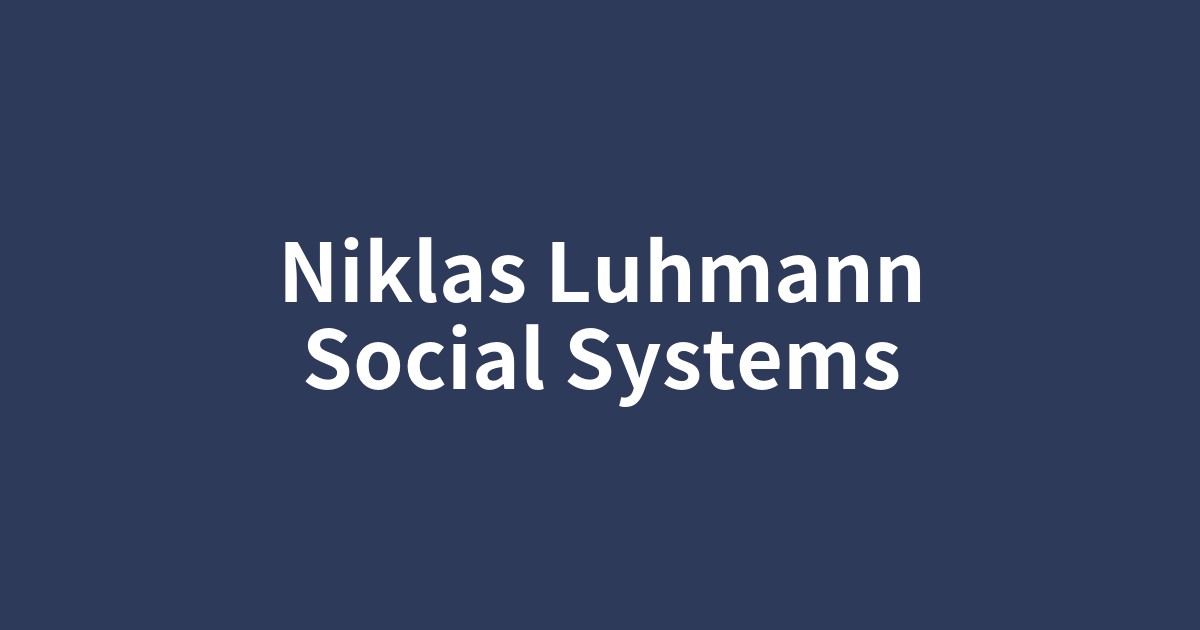このページは、歴史や文化の物語を楽しみながら、その文脈の中で重要な英単語を自然に学ぶための学習コンテンツです。各セクションの下にあるボタンで、いつでも日本語と英語を切り替えることができます。背景知識を日本語で学んだ後、英語の本文を読むことで、より深い理解と語彙力の向上を目指します。

社会とは「コミュニケーション」の連鎖である。法、経済、政治といった各システムが、いかにして自己を維持・再生産していくかを捉える複雑な理論。
この記事で抑えるべきポイント
- ✓社会とは「人間」の集まりではなく、「コミュニケーション」そのものが連鎖し、自己を生産していくシステムであるという視点。
- ✓法・経済・政治といった社会の各領域(サブシステム)は、それぞれ独自のルール(コード)で動いており、互いに直接介入できないという考え方。
- ✓システムが自らの要素を自ら作り出す「オートポイエーシス」という概念。これにより、社会システムがいかにして安定的に存続するかが説明される。
- ✓現代社会の捉えがたい「複雑性」を、システムがどのように処理(縮減)しているのかを理解する一つの分析ツールとしての理論の価値。
導入
「社会とは何でしょうか?」この素朴な問いに、多くの人は「人々の集まり」と答えるかもしれません。しかし、もし「社会の主役は人ではなく、言葉のやり取り、つまり“コミュニケーション”そのものだ」と主張する理論があったとしたら。この記事では、ドイツの社会学者ニクラス・ルーマンが提唱した、複雑で刺激的な「社会システム理論」の世界へご案内します。
Introduction
"What is society?" To this simple question, many might answer, "a collection of people." But what if there was a theory arguing that the protagonist of society is not people, but the exchange of words—that is, "communication" itself? In this article, we will guide you into the complex and stimulating world of "Social System Theory" as proposed by the German sociologist Niklas Luhmann.
主役交代:「人間」から「コミュニケーション」へ
従来の社会学が「行為する人間」を社会の基本単位と見ていたのに対し、ルーマンはなぜ「コミュニケーション(communication)」を基本単位に据えたのでしょうか。この根本的な発想の転換が、理論全体の鍵となります。彼の理論によれば、社会とは、人間を構成要素としない閉じた「システム(system)」なのです。個々の人間(の意識や身体)は、システムの内部ではなく、その外部にある「環境(environment)」の一部として捉えられます。社会の内部では、ただひたすらにコミュニケーションが次のコミュニケーションを生み出し、連鎖していく。これがルーマンの描く社会の姿です。
A Change of Protagonists: From "Humans" to "Communication"
While traditional sociology viewed the "acting human" as the basic unit of society, why did Luhmann establish "communication" as the fundamental unit? This radical shift in thinking is the key to his entire theory. According to him, society is a closed "system" that does not include humans as its components. Individual humans (their consciousness and bodies) are not inside the system but are considered part of its external "environment." Within society, communication endlessly generates the next communication, creating a chain. This is the picture of society that Luhmann paints.
システムはいかにして自らを創り出すのか?「オートポイエーシス」という仕組み
システムが存続するためには、常に新しいコミュニケーションを生み出し続ける必要があります。この自己生産のメカニズムを、ルーマンは生命科学の用語「オートポイエーシス(Autopoiesis)」を用いて説明しました。これは「自己(auto)を創造する(poiesis)」という意味のギリシャ語に由来します。例えば、法システムは「合法/違法」という判断を下すコミュニケーションを次々と生み出します。この新しい判断は、過去の判例や法典といった、同じ法システムが生み出した要素を参照して行われます。このように、システムは自らの要素を自らで作り出し、それによって自らを維持し続ける、自己準拠的な運動体なのです。
How Does a System Create Itself? The Mechanism of "Autopoiesis"
For a system to continue to exist, it must constantly produce new communication. Luhmann explained this self-producing mechanism using the biological term "Autopoiesis," derived from Greek words meaning "self (auto)" and "creation (poiesis)." For example, the legal system continuously generates communications that make judgments of "legal/illegal." This new judgment is made by referencing past precedents and legal codes—elements produced by the same legal system. In this way, a system is a self-referential entity that creates its own elements by itself, thereby maintaining itself.
分断された現代社会?─機能的に分化したサブシステムたち
現代社会において、政治家が科学研究に直接命令したり、経済の論理だけで法的な判決が下されたりすることは、原則としてありません。ルーマンは、この状況を社会が複数のサブシステムに分かれているからだと説明します。現代社会は、経済、政治、法、科学といった、それぞれが特定の「機能(function)」を担うサブシステムへと分化しています。そして、各サブシステムは、独自の中心的なルールである「コード(code)」を持っています。経済は「支払い/非支払い」、法は「合法/違法」、科学は「真/偽」というコードに従って動きます。これらのシステムは互いに直接介入できませんが、「構造的カップリング」という形で、互いの存在を前提とし、影響を与え合っているのです。
A Fragmented Modern Society? — Functionally Differentiated Subsystems
In modern society, it is generally not possible for a politician to directly command scientific research, or for a legal judgment to be made based solely on economic logic. Luhmann explains this situation by stating that society is divided into multiple subsystems. Modern society has differentiated into subsystems such as economy, politics, law, and science, each responsible for a specific "function." Each subsystem has its own central rule, or "code." The economy operates on the code of "payment/non-payment," law on "legal/illegal," and science on "true/false." While these systems cannot directly intervene with each other, they are interconnected through "structural coupling," presupposing each other's existence and mutually influencing one another.
私たちは世界をどう見ているのか?─「観察」と「意味」の役割
では、システムはどのようにして世界を捉えているのでしょうか。ルーマンによれば、システムは必ず何らかの「差異(difference)」、つまり「区別」を用いて世界を「観察(observation)」します。例えば、法システムは「合法/違法」という差異を用いて事象を観察し、経済システムは「支払い/非支払い」という差異で観察します。この観察という行為を通じて、無限の可能性の中から特定の「意味(meaning)」が選び取られ、コミュニケーションが成立します。このプロセスは、私たち自身が、いかに特定のフレームワークを通して現実を認識し、意味づけているのかという、現代的な問いにも深く繋がっています。
How Do We See the World? — The Role of "Observation" and "Meaning"
So, how does a system perceive the world? According to Luhmann, a system always uses some form of "difference," or distinction, to make an "observation" of the world. For instance, the legal system observes events using the difference of "legal/illegal," while the economic system observes with the difference of "payment/non-payment." Through this act of observation, a specific "meaning" is selected from infinite possibilities, and communication is established. This process is deeply connected to the contemporary question of how we ourselves recognize and assign meaning to reality through specific frameworks.
結論
ルーマンの社会システム理論は、人間を社会の中心から意図的に外すという、一見すると非人間的な視点を提供します。しかし、まさにその視点ゆえに、現代社会の各領域がなぜこれほどまでに自律的に、時に私たちのコントロールを超えて暴走するように見えるのかを、鮮やかに説明する力を持っています。この世界に満ちる無限の「複雑性(complexity)」を、各システムがいかにして独自のやり方で処理(縮減)しているのか。この理論は、そのダイナミズムを解き明かすための強力な分析ツールとなり得ます。もちろん、その非人間性や、変化を説明しにくいといった批判も存在します。しかし、ルーマンの理論は、当たり前だと思っていた「社会」の姿を根底から揺さぶり、私たちに新たな知的な探求の扉を開いてくれるのです。
Conclusion
Luhmann's Social System Theory offers a perspective that, at first glance, seems inhuman by deliberately removing humans from the center of society. However, it is precisely this perspective that gives it the power to vividly explain why the various domains of modern society appear so autonomous, sometimes seeming to run out of control beyond our grasp. How does each system process (or reduce) the immense "complexity" that fills the world in its own unique way? This theory can be a powerful analytical tool for unraveling that dynamism. Of course, it faces criticism for its inhuman aspect and its difficulty in explaining change. Nevertheless, Luhmann's theory fundamentally challenges our conventional understanding of "society" and opens a new door for intellectual exploration.
テーマを理解する重要単語
meaning
ルーマン理論において、コミュニケーションが成立するプロセスで選び取られるものを指します。システムが「観察」を通じて無限の可能性の中から特定の「意味」を生成することで、次のコミュニケーションが可能になります。世界の捉え方という根源的な問いに関わる言葉です。
文脈での用例:
The meaning of this passage is not entirely clear.
この一節の意味は完全には明確ではない。
environment
ルーマン理論において特異な意味を持つ単語です。社会「システム」の外部にあるもの全てを指し、驚くべきことに個々の人間(の意識や身体)も「環境」の一部とされます。このシステム/環境の区別は、彼の理論の最もラディカルな点の一つです。
文脈での用例:
We must take action to protect the natural environment.
私たちは自然環境を守るため行動しなければなりません。
function
現代社会が複数のサブシステムに分かれている状態を説明する鍵です。経済、政治、法といった各領域は、社会全体の中で特定の「機能」を担うために分化したとされます。この単語は、社会の複雑な構造を理解する上で中心的な役割を果たします。
文脈での用例:
Each part of the system has a specific function.
システムの各部分には特定の機能がある。
system
ルーマン理論の根幹をなす言葉。彼によれば社会とは、人間を外部の「環境」とし、内部ではコミュニケーションだけが連鎖する閉じた「システム」です。この定義を把握することが、記事全体の非人間的な視点を理解する鍵となります。
文脈での用例:
The company is introducing a new computer system to improve efficiency.
その会社は効率を上げるために新しいコンピューターシステムを導入している。
communication
この記事の核心概念です。ルーマンは社会の基本単位を「人間」ではなく「コミュニケーション」そのものと捉えました。社会とはコミュニケーションが次のコミュニケーションを生み出す連鎖である、という彼の理論の出発点を理解するために必須の単語です。
文脈での用例:
Clear communication is essential for a successful team.
明確なコミュニケーションは、チームが成功するために不可欠です。
code
各サブシステムが用いる独自の中心的なルールを指す専門用語です。経済は「支払い/非支払い」、法は「合法/違法」といった二項対立の「コード」に従って作動します。この記事で描かれる、各領域の自律性を理解するために欠かせない概念です。
文脈での用例:
The Napoleonic Code had a major influence on the laws of many countries.
ナポレオン法典は多くの国の法律に大きな影響を与えた。
autonomous
この記事が解き明かそうとする、現代社会の各領域の性質を表す形容詞です。法や経済といったサブシステムが、なぜ互いに独立し、時に人間のコントロールを超えて「自律的」に動いているように見えるのか。その謎に迫る上で中心となるキーワードです。
文脈での用例:
The region was granted autonomous status within the country.
その地域は国内で自治権を与えられた。
observation
システムが世界をどのように捉えるかを説明する行為です。ルーマン理論では、システムは「差異」を用いて世界を「観察」することで、無限の可能性の中から特定の意味を切り取ります。私たちの認識の仕組みを考える上でも示唆に富む重要な概念です。
文脈での用例:
The scientist's theory was based on careful observation of animal behavior.
その科学者の理論は、動物の行動の注意深い観察に基づいていた。
complexity
社会システムが直面し、処理すべき課題を指します。世界は本来、システムが処理しきれないほどの「複雑性」に満ちています。各システムは独自のコードを用いてこの複雑性を縮減している、というのがルーマンの考え方で、彼の理論の有効性を示す部分です。
文脈での用例:
The complexity of the issue makes it difficult to solve.
その問題の複雑さが、解決を困難にしている。
differentiate
現代社会の成り立ちを説明する動詞です。社会が、経済、政治、法といった特定の機能を持つサブシステムへと「分化」してきたプロセスを指します。「機能的分化」という考え方は、なぜ各領域が互いに直接介入できないのかを解き明かす鍵です。
文脈での用例:
It's important to differentiate between fact and opinion.
事実と意見を区別することは重要です。
difference
システムの「観察」の道具として使われる重要な概念です。法システムが「合法/違法」という「差異(区別)」を用いて世界を見るように、あらゆる観察はこの差異の使用が前提となります。この記事の後半、世界の認識方法に関する議論の核心をなす単語です。
文脈での用例:
There is a significant difference between knowing and understanding.
知っていることと理解していることの間には、大きな違いがある。
autopoiesis
システムの自己生産メカニズムを説明する専門用語です。「自己(auto)を創造する(poiesis)」を意味し、システムが自らの構成要素を自らで作り出し、それによって存続することを指します。この記事の具体例(法システム)を理解する上で不可欠です。
文脈での用例:
The theory of autopoiesis explains how living beings maintain their own organization.
オートポイエーシスの理論は、生命がいかにして自らの組織を維持するかを説明します。